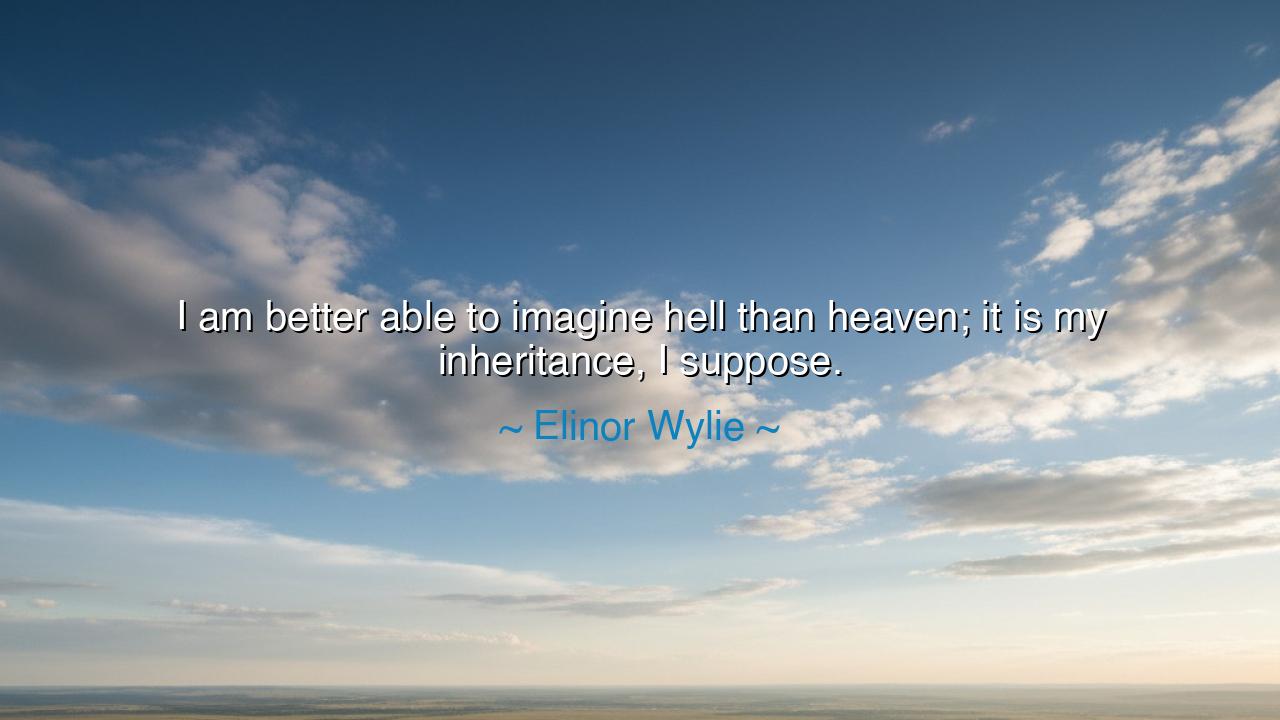
I am better able to imagine hell than heaven; it is my






The poet Elinor Wylie, in her haunting words—“I am better able to imagine hell than heaven; it is my inheritance, I suppose”—unveils a truth both ancient and personal. In this single sentence, she speaks for all who have inherited the burden of human sorrow. To imagine hell is easy; it lies near, in the memory of pain, in the echoes of betrayal, in the sight of injustice. But heaven—that realm of pure peace and joy—feels distant, a whisper too faint for mortal ears. The poet confesses that this inclination toward darkness is not of her choosing; it is her inheritance, the legacy of generations who have known suffering as their constant companion.
Long before her time, the philosophers of Greece and the sages of the East spoke of this same condition. They said that mankind carries the shadow of the fall, a remembrance of loss that clings to the soul. The human mind, formed amid struggle and mortality, recalls agony more vividly than bliss. One taste of fire, and we remember the flame forever; yet the warmth of sunlight, gentle and pure, we soon forget. Thus, Wylie’s words echo the lament of ancient hearts—those who walked through war, famine, and exile, learning to name hell with precision but finding no clear language for heaven.
Consider the tale of Dante Alighieri, who wandered through his own imagined inferno before glimpsing paradise. His Inferno is vivid, burning with motion and memory; his Paradiso, though filled with light, is distant, abstract, nearly beyond human grasp. Why? Because pain gives shape to thought, while joy dissolves it. We are sculpted by our sorrows, etched by them, and so we see them more clearly. Dante, like Wylie, could imagine hell with clarity, for he had lived in its likeness on earth—banished from his home, stripped of peace. Heaven, by contrast, remained a vision he could only approach with trembling faith.
Yet let us not despair at this inheritance. The poet does not write to imprison us within our grief, but to awaken recognition: that our awareness of suffering can become the very soil from which compassion grows. To know hell is to know what must never be repeated; to imagine it is to yearn for its opposite. The heart that has burned most deeply often hungers most fiercely for light. And in that hunger lies redemption. The ability to imagine heaven, though difficult, is not denied to us—it must be cultivated, like a seed buried beneath ash.
In the chronicles of history, the martyrs and visionaries who rose from torment embody this truth. Viktor Frankl, a prisoner in the Nazi camps, once wrote that even in the depths of suffering, a man may find meaning—that “those who have a ‘why’ to live can bear almost any ‘how.’” He too had seen hell, and yet from its embers he forged hope. His inheritance was not despair, but the strength to transform pain into purpose. In this way, Wylie’s lament becomes a challenge: will we be chained by our inheritance, or will we transmute it into wisdom?
The lesson, then, is clear: do not flee from the darkness within you, but learn to know it, name it, and outgrow it. For the soul that denies its hell can never find its heaven. Let the memory of pain make you gentle; let its weight make you strong. When bitterness tempts you to close your heart, remember that heaven is not a place beyond the sky—it is the courage to love again after ruin, to dream after disappointment, to believe in goodness though evil speaks louder.
In your own life, practice this sacred art. When sorrow comes, do not turn away—sit with it, understand it, and let it teach you what peace should mean. When joy arrives, cherish it consciously, as a pilgrim honors holy ground. Each day, imagine heaven not as perfection, but as kindness, as forgiveness, as the quiet joy of one moment fully lived. For though we may be born to remember hell, we are also born with the power to create heaven—not beyond this life, but within it.






AAdministratorAdministrator
Welcome, honored guests. Please leave a comment, we will respond soon